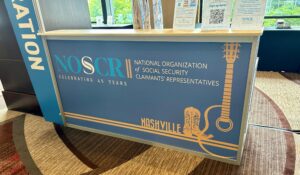Advancing Disability Advocacy: Key Takeaways from the 2024 NOSSCR Conference in Nashville
The annual National Organization of Social Security Claimants’ Representatives (NOSSCR) conference recently concluded in Nashville, Tennessee. This event brings attorneys and industry experts together to discuss the intricacies of the Social Security Disability claims process. The conference is designed to sharpen skills in optimizing case results, streamline law firm management, and modernize outdated processes.
Challenging Vocational Experts
One of the major highlights from the conference was the focus on the role of vocational experts in Social Security Disability hearings, who are tasked with identifying jobs that they feel claimants are capable of performing. Attorneys were encouraged to critically evaluate the job roles suggested by vocational experts, considering factors such as:
- Nonexistent Job Roles: Vocational experts regularly reference jobs that are seemingly outdated or non-existent in today’s job market, such as “addresser” or “document preparer.” The Dictionary of Occupational Titles (DOT) defines an addresser’s job as a sedentary, unskilled position with duties that include “Addresses by hand or typewriter, envelopes, cards, advertising literature, packages, and similar items for mailing. May sort mail.” Although these tasks may overlap with some administrative roles, such as that of a receptionist, the specific role of an addresser is not in demand in today’s job market.
- Irrelevant Skill Sets: When claimants cannot do the work they have done in the past, it is unrealistic to expect them to transition to roles that are either old or require skills they do not possess.
Modernizing Disability Hearings
Rather than accepting outdated job roles listed by vocational experts, attorneys were urged to critically assess the realism of these positions. For instance, challenging the practicality of finding a job as an “addresser” in the current job market introduces skepticism into the record, thereby shifting the burden of proof back to the Social Security Administration (SSA). This strategic questioning can be crucial, especially for claimants under 50, where it is necessary for attorneys to demonstrate that a claimant is unable to perform any job within the national economy.
Assessing the relevance and realism of jobs suggested by vocational experts offers a modernized strategy for attorneys representing claimants in Social Security Disability hearings. By challenging these outdated and unrealistic job roles, attorneys can advocate more effectively for their clients and influence the broader system of Social Security to consider the current realities of the job market. This approach ensures a more equitable evaluation process for claimants who are unable to work due to their disabilities, while keeping the shifting dynamics of today’s job market in mind.
Significant Changes in SSA Procedures
Other significant developments discussed at the conference involve changes in different phases of a Social Security Disability claim including:
- Reducing the Past Relevant Work (PRW) Lookback Period from 15 years to five years: Effective in June 2024, the SSA will revise its method for evaluating claimant’s past work from the last 15 years to just five years. This change aims to reduce errors and inefficiencies, reflecting a more accurate and relevant account of a claimant’s recent work history and transferable skills.
- Review of Current Required Forms: SSA Commissioner Martin O’Malley is reviewing many of the forms required throughout the Social Security Disability claims process and plans to eliminate any outdated or redundant requirements, which will make the process less burdensome for both representatives and claimants.
- Status Report Checks: Also effective in June 2024, representatives will have the ability to review a status report for cases at both the initial and reconsideration stages, a report previously only available once a case reached the hearing stage. This early access will better equip representatives to effectively manage developments and decisions, thereby streamlining the claimant’s experience.
- Increase in Attorney Fee Cap: Since November 2022, the attorney fee cap has been set at $7,200. This cap is scheduled to increase to $9,200 later this year. Future increments will be more systematic, aligning with the annual cost of living adjustment (COLA). Commissioner O’Malley explains the rationale behind the fee increase: “Our programs can be complex and quality representation—from initial claims to appeals—helps people navigate the process.”
Enhancing Claimant Support Through Strategic SSA Reforms
These comprehensive changes initiated by the SSA are designed to enhance the efficiency and accuracy of the disability claims process. By reducing the lookback period for past relevant work, streamlining paperwork, offering earlier access to status reports, and adjusting attorney fees, the SSA is taking significant steps to alleviate the burden on claimants and their representatives. These changes not only promise a more responsive system but also reflect a commitment to adapting to the needs of claimants and ensuring that they receive the support they require in a timely and effective manner.
Advocacy and The Future
NOSSCR plays a crucial role in interfacing with the Social Security Administration and Commissioner O’Malley, offering a channel for feedback and suggestions on how the Social Security Disability claims process can improve. The significant changes discussed at the conference help reshape how representatives and the SSA handle claims. The honed focus on challenging vocational expert testimony, changes in SSA processes, and regularly adjusting the attorney fee cap are just the beginning of what appears to be a pivotal shift in how representatives can more effectively advocate for their clients. As these new strategies and procedures are implemented, they promise to bring about significant improvements in the representation and outcomes of Social Security Disability claims.
Additional Resources
Learn more about the different programs the Social Security Administration offers or contact us at 877-529-4773 for a FREE case evaluation.


